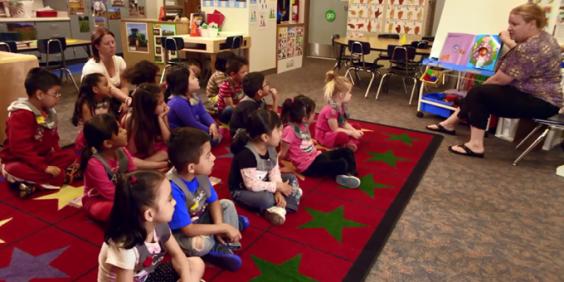In Utah, United Way Makes Strong Link Between Education and Health

Education is a key component to health – we know that better educated individuals live longer, healthier lives than those with less education, and their children are more likely to thrive. In Utah, local nonprofits, service providers, community groups and more are partnering together not to only to boost student achievement at schools but health for the whole community as well.
Through Promise Partnerships and a County Health Rankings & Roadmaps Roadmaps to Health Community Grant, the United Way – a national partner of County Health Rankings & Roadmaps – is leveraging relationships with organizations, service providers, and more to help schools boost achievement and help keep families healthy. United Way of Salt Lake is broadening the opportunities to learn and also engaging families in their own health.
Neighborhood Centers
In many neighborhoods, a local school can be the hub of activity – and the United Way of Salt Lake is bringing educational and health services to the community through its local schools. Each of the Neighborhood Center schools has a United Way employee (called a Community School Director) focused on using the community resources to help local families. This can come in the form of afterschool mentoring/tutoring or a mobile health clinic. The Community School Director is leveraging partnerships to bring free services to students and the public.
In a community such as South Salt Lake (a city of nearly 25,000 with a large immigrant/refugee population), every school is also a United Way of Salt Lake Neighborhood Center. The effort began out of turning an apartment complex community center into a United Way Neighborhood Center, establishing services such as a parent class to orient newly resident families to the American school system. That work led to bringing that model to schools.
The work is guided by needs assessments in each of the schools determining what services should be offered to students and their families. Additionally, the Community School Director has access to student data and, in conjunction with teachers, can implement interventions. If tardiness is an issue, for example, staff can reach out to a family to see if there is a need infringing on attendance. Those interventions are tracked based on student achievement to gauge their effectiveness.
The centers also have an afterschool program focused on the school’s curriculum. Entrance is offered to students who are nominated by teachers. As part of the program, AmeriCorps volunteers provide one-on-one mentoring and tutoring.
“Everything supports what’s happening in the classroom,” said Lindsey Edwards, the United Way of Salt Lake’s Director of Community School Partnerships.
The Neighborhood Center effort is an embodiment of the Collective Impact process, pulling together the resources of various groups to accomplish one goal. The United Way is joined by the public schools, police, clinical and social services, local government, businesses and more on its mission.
“Collective Impact is absolutely how this is all possible,” Edwards said.
Early Learning Network
Of course, schools are still primary academic settings, and United Way of Salt Lake is focusing on early learning through a Roadmaps to Health Community Grant. The public school system, government and nonprofits are aligning their missions to help children enter kindergarten ready to learn.
Focused on the city of South Salt Lake, the Early Learning Network advocates for the benefits of high-quality early learning, helps foster interventions in students before they enter the public school system, and promotes legislation to ensure quality school readiness in the state.
In South Salt Lake, the majority of children the Network supports are low income, refugees, or have other characteristics that make them more likely to enter kindergarten behind their peers. In 2012, high school and college graduation rates were below state averages, and less than half of South Salt Lake students were reading on grade level. To address these issues, local schools, community partners, and the city of South Salt Lake are rallying around a path that begins before the schoolhouse door. Research shows that evidence-based investments in children from birth to age five improve school readiness and lower rates of crime, teen pregnancy, substance abuse, and obesity.
Paying for success
Part of the United Way’s work on early learning includes highlighting newly signed legislation that opens up access to preschool for more families across the state. The Utah School Readiness Initiative not only secured $3 million in funding for preschool in Utah, but is the country’s first piece of legislation to use “pay for success” social impact loans for early childhood education. The loans provide for private investors to support intervention programs – such as early learning curriculums – and get paid back if the strategies produce intended results, such as cost avoidance of special education or remedial services. The measure was signed into law in the Spring of 2014.
United Way Worldwide is a National Partner of County Health Rankings & Roadmaps, increasing awareness about the Rankings to their members, affiliates and allies and guiding them to the Roadmaps to Health Action Center to support them in taking action. Learn more about our National Partners here.
